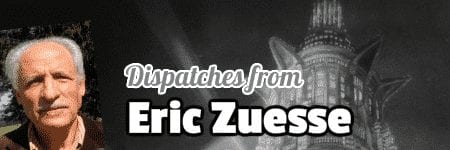Is the Buildup to World War I Being Repeated for WWIII? The great scholar of Turkish history, Taner Akçam, has described today’s geopolitics — the alliances and hostilities toward possibly another World War — as being not ideologically based like WWII, but instead greed-based (empire-grabbing) like WWI: These are wars of power, influence, and control over the use of Middle Eastern energy resources and the “security issues” related to it. It is quite obvious that the sides in this war are not “those who want democracy and human rights" versus "those in favor of evil dictatorships.” The axes that are now starting to take shape are proof of this: Saudi Arabia and Israel – openly supported by the United States (and likely Egypt over time) – are forming one alliance; Russia, Iran, and Turkey are establishing another. A tableau reminiscent of 1918 power blocs. Today’s alliances are modernized versions of WWI. World War I was a mess of alliances on each of its two sides, the Central Powers, versus the Entente Powers. The aristocracies that were on the side of the Central Powers included (among others) the following: Jabal Shammar (Saudi Arabia allied with Turkey); Germany; Austria (including Croatia & Bosnia); Ukraine; Poland; Lithuania; Georgia; Turkey; Italy. The aristocracies that were on the side of the Entente Powers included: France, China; Japan; Czechoslovakia; Russia; Serbia; UK; Canada; US. Today, we instead have the West: US; UK; Saudi Arabia (UK-allied ‘Arab Revolt’ that ended in 1925 with Ibn Saud’s victory); Israel; EU led by Germany; Ukraine; Japan; South Korea; versus the East: Russia; Iran; Turkey; China. An odd-man-out is North Korea, which will be supported by China if it stops developing its nuclear program beyond what’s needed for its self-protection (protection against repeating what had happened to Saddam Hussein and Muammar Gaddafi), but which will be opposed by China if it develops an aggressive, conquest-oriented, imperialistic, nuclear capability (which would reduce security not only for Japan and South Korea, but also for China). In WWI, there was a long list of neutral countries (including Switzerland, and all of Scandinavia, plus the Western Hemisphere south of the US); and, in a prospective WWIII, there would also be many such countries on the sidelines. (All of them, however, would become subject to the intense nuclear radiation after the War, and would therefore likewise become unlivable — neutrality wouldn’t save any country from destruction.) But, after the war was done, what did the world gain and lose from it? And what would the world gain and lose from a prospective WWIII? So: how sane was WWI? And how sane would be a WWIII? Why, then, was WWI even waged, at all? And what does that history teach us about what seems to be happening today? I think that it teaches us a lot. It teaches us that mistakes can happen. Signals and intentions can be misread. The priorities of leaders can be misunderstood (such as were the priorities of Kaiser Wilhelm II — that he placed the divine right of kings as being the supreme obligation of any king to protect and defend in order to keep his personal honor — misread, until too late and the Archduke Ferdinand of Austria became assassinated on 28 June 1914 by the well-intentioned naive anti-imperialist Gavrilo Princip, who couldn’t have cared less about whether the assassination, which he was planning, would violate what the German Emperor felt to constitute the ultimate moral principle). History during the past century has definitely taught us (though humans seem not to have learned it) that humans have now (with nuclear weapons, and also with human-caused global warming) acquired, by means of the fruits of our technological ingenuity, far more power, on a far bigger scale, than humans possess the intelligence and character to be able to control, and that we are thus becoming increasingly dangerous and destructive to the entire planet, like we never have been before, throughout all of human history. We’re now, tragically, clearly out of our depth. Surely, this will end in WWIII, unless something else ends us even sooner. Humans seem to be destroying the planet, by a final War, if not by a global burnout. A WWIII would bring the end much sooner than global burnout would, and now seems likely to occur. All sane bets are thus off. All that remains now is just bad gambles. Anyone who thinks otherwise needs to tell everybody else why optimism isn’t stupid, under the present (and past) circumstances — in other words, in the light of history. I agree with Akçam’s analogy between the buildup toward WWI, and today’s buildup toward WWIII. Kaiser Wilhelm II felt to be the ultimate moral principle the divine right of kings; and America’s ruling aristocracy today feel that the ultimate moral principle is that, as US President Barack Obama expressed more frequently than any other US President has, the US is the only “indispensable” country — that all other nations are either vassals or else enemies of the US, but are, in either case, “dispensable.” Obama’s successor, Donald Trump, has still not condemned and disowned that fascist view. Consequently, any US-allied country needs to accept that not only are the US aristocracy’s enemies “dispensable” to the US aristocracy, but that the US aristocracy’s allies are, likewise, “dispensable” to America’s Government. It’s an “Either you’re with us, or else you are against us” situation, for any currently US-allied country — no current US ally will be allowed to become neutral. This places an incentive upon Turkey to outright withdraw from NATO, and even for Germany perhaps to do so; but, for some reason, the opposing alliance, of Russia, China, and Iran, are not as yet forming themselves in any official way as constituting an alliance, such that Turkey or maybe even Germany would withdraw from NATO and join “the opposite side.” It’s not yet clear that there yet is an opposite side. (Maybe that will be coming soon.) The more that the US regime blocks peaceful and mutually advantageous paths forward, as it has been doing since 2013, the more likely that its competitors will announce that the US and its allies are “enemies,” and are not merely “competitors.” America can’t continue much longer to proclaim itself to be the only indispensable country, before everything starts going onto a war-footing; and the step from that situation to a nuclear armageddon could turn out to be surprisingly short. 
ERIC ZUESSE, Senior Contributing Editor Investigative historian Eric Zuesse is the author, most recently, of They’re Not Even Close: The Democratic vs. Republican Economic Records, 1910-2010, and of CHRIST’S VENTRILOQUISTS: The Event that Created Christianity. Besides TGP, his reports and historical analyses are published on many leading current events and political sites, including The Saker, Huffpost, Oped News, and others.
[premium_newsticker id=”154171″]





